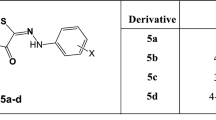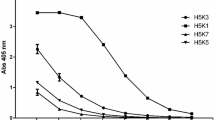Abstract
THERE is a shortage of antimycotic drugs1,2, especially those for the treatment of systemic fungal diseases. Patients on immunosuppressive therapy or cancer chemotherapy are particularly susceptible to opportunist fungal infections3, and histoplasmosis, blastomycosis and coccidioidomycosis are major health problems in some tropical countries4. For such infections, amphotericin B, 5-fluorocytosine, miconazole and clotrimazole are mainly used. The first of these drugs is nephrotoxic and the second often induces resistant strains of fungi5. Griseofulvin is given orally but is effective only for cutaneous infections6. A new approach, which we are investigating, is to attack the fungal cell wall by way of the glucans it contains. Preliminary results obtained with ‘mycolases’, mixtures of enzymes of fungal origin containing various carbohydrases, including chitinase and laminarinase are reported here. We found that, used in conjunction with normally ineffective antimycotic drugs, mycolases were successful against systemic fungal disease in mice.
This is a preview of subscription content, access via your institution
Access options
Subscribe to this journal
Receive 51 print issues and online access
$199.00 per year
only $3.90 per issue
Buy this article
- Purchase on Springer Link
- Instant access to full article PDF
Prices may be subject to local taxes which are calculated during checkout
Similar content being viewed by others
References
Br. J. Ophthal. 60, 605–606 (1976).
Bodey, G. P. S. Af. med. J. 52, 1009–1015 (1977).
Mason, J. W., Stinson, E. B., Hunt, Sharon A., Schroeder, J. S. & Rider, A. K. Ann. intern. Med. 85, 69–72 (1976).
Proc. 3rd int. Conf. Mycoses, Pan-American Health Association; Sci. Publ. 304 (1975).
Block, E. R., Jennings, A. E. & Bennett, J. E. Antimicrob. Ag. Chemother. 3, 649–656 (1973).
Gentles, J. C. Nature 182, 476–477 (1958).
Bartnicki-Garcia, S. A. Rev. Microbiol. 22, 87–108 (1968).
Aronson, J. M. in The Fungi Vol. I (eds Ainsworth, G. C. & Sussman, A. S.) 49–76 (Academic, New York, 1965).
Hunsley, D. & Burnett, J. H. J. gen. Microbiol. 62, 203–218 (1970).
Davies, D. A. L. Adv. Carbohyd. Chem. 15, 271–340 (1960).
Peberdy, J. F., Buckley, C. E. & Gibson, R. K. in Proc. 3rd int. Symp. Yeast Protoplasts (eds Villanueva, J. R., Garcia-Acha, I., Gascon, S. & Uruburu, F.) 381 (Academic, London, 1973).
Endo, A., Kakiki, K. & Misato, T. J. Bact. 104, 189–196 (1970).
Miura, O. Tohoku J. exp. Med. 59, 403–409 (1954).
Bartnicki-Garcia, S. & Lippman, E. J. gen. Microbiol. 42, 411–416 (1966).
Gooday, G. W. J. gen. Microbiol. 99, 1–11 (1977).
Peto, R. & Pike, M. C. Biometrics 29, 579–584 (1973).
Gale, E. F., Johnson, A. M., Kerridge, D. & Koh, T. Y. J. gen. Microbiol. 87, 20–36 (1975).
Author information
Authors and Affiliations
Rights and permissions
About this article
Cite this article
DAVIES, D., POPE, A. Mycolase, a new kind of systemic antimycotic. Nature 273, 235–236 (1978). https://doi.org/10.1038/273235a0
Received:
Accepted:
Issue Date:
DOI: https://doi.org/10.1038/273235a0
This article is cited by
-
Isolation and Characterization of the ALP1 Protease from Aspergillus fumigatus and Its Protein Inhibitor from Physarium polycephalum
Russian Journal of Bioorganic Chemistry (2005)
-
Mycolase II: an enzyme antifungal agent interacts with the polyene antibiotic pimaricin in the treatment of keratomycosis
International Ophthalmology (1982)
Comments
By submitting a comment you agree to abide by our Terms and Community Guidelines. If you find something abusive or that does not comply with our terms or guidelines please flag it as inappropriate.



